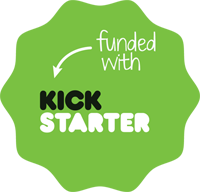Tell me if this story sounds familiar: a Kickstarter project gets off to a great start, it exceeds the initial goal, and then the stretch goals begin. As the group excitement grows, the stretch goals get loftier and loftier - and then the project fails to meet its deadline. Even if the goals were made with the purest of intentions, I've seen many popular kickstarter efforts over-promise and under-deliver. Today I'm going to discuss the danger of project scope, and the importance of task completion.
Finish Something
In my opinion a completed, humble, task is better than an ambitious and unfinished one. Let's envision an indie video game as the product for a kickstarter campaign. One option would be to promise more and more additions to the game as stretch goals - risking a delayed launch due to the extra production work. An alternative might be to promise episodic content as the stretch goals -- downloadable add ons to the game available after the initial launch. This second scenario favors task completion: the core game launches, and then add ons are available later. Players get to enjoy the game sooner, and the developer hasn't scheduled himself into an impossible deadline.
Kickstarter is one example, but this phenomenon extends into all aspects of our lives. Have you ever started a diet only to lose focus a week later? What about a daily exercise routine that was destined to fail? Everyone has moments of excitement where anything seems possible - sometimes turning them into impossible obligations. Learning to temper this impulse with realistic expectations is an important life, and art, skill.
Scope, Scope, Scope
If you're learning to paint, it's tempting to give yourself a list of assignments to practice every day. In the past I've attempted daily practice of gesture drawing, portraits, photo studies, etc. Without fail, daily obligations like these don't manage to last more than a month or so. I don't have the research to back up my theory, but it seems like routinely failing challenges like this sets a dangerous personal precedent.
With all of this in mind, I recommend starting small and working larger. Like downloadable add ons to a finished indie game, think of a small 'core' to your new habit or project. Make sure your core is realistic, and has room to grow. If my new project was a redesign of the 'Little Red Riding Hood' fairy tale I might start with a small set of designs. The wolf, little red riding hood, and one location (maybe a section of trail?) would be reasonable. Even if I stopped now, the project would be complete. If I wanted to continue, the next tier might include additional locations, props, or even some storyboards. In this manner, the project is both realistic and open to expansion.
Train Your Brain
Working from completion to completion is much more satisfying than working from failure to failure. Developing a sense of personal accountability will allow you to confidently approach larger challenges. Once you've experienced a long string of completed projects, the next one seems much more attainable. The real challenge becomes breaking large projects into smaller, stand-alone, components.
What's Your Story?
I'm sure you've had your own run-ins with project scope. If you're willing to share them, feel free to do so in the comments! We can all learn from the pitfalls and successes of others, so join the conversation.



